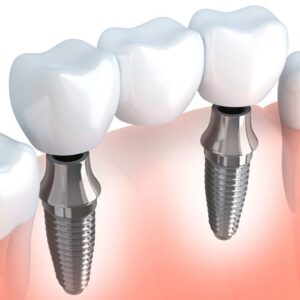 Tooth loss is a serious condition that can result in oral health problems and affect the appearance of your smile. Whether you have lost one or more teeth due to decay, gum disease, or an injury to the mouth, you may be an ideal candidate for dental implants. Dental implants are surgically placed in the jawbone; these titanium posts replace your natural tooth roots. The implants can be attached to a restoration, or prosthetic, that replaces the missing teeth. To find out if you are a good candidate for dental implants, contact our Jackson, MS practice today.
Tooth loss is a serious condition that can result in oral health problems and affect the appearance of your smile. Whether you have lost one or more teeth due to decay, gum disease, or an injury to the mouth, you may be an ideal candidate for dental implants. Dental implants are surgically placed in the jawbone; these titanium posts replace your natural tooth roots. The implants can be attached to a restoration, or prosthetic, that replaces the missing teeth. To find out if you are a good candidate for dental implants, contact our Jackson, MS practice today.
What Are Dental Implants?
Dental implants are screw-like posts, typically made of titanium, that are surgically implanted into the bone of your jaw. The bone grows and fuses to the implants during the healing process, anchoring them in place so the dentist can attach the replacement teeth. Implants can be attached to a single crown, a bridge, or denture. A crown is used to replace a single missing tooth. A bridge can replace two to three consecutive teeth missing from a single quadrant of the mouth. Dentures can replace several missing teeth or all of the teeth in the upper and lower jaws.
The Ideal Dental Implant Candidate
Generally, anyone that is missing teeth is a good candidate for dental implant surgery. However, ideal candidates should also be in good health, have good jawbone density, and not smoke. Our dentists will examine your oral health and review your medical and dental history to determine if you are an ideal dental implant patient.
Health Requirements for Dental Implants
When consulting your dentist, it is important to provide your full medical and dental history, as well as a list of all medications you are currently taking, whether over the counter or prescription. There are some conditions that may prevent you from being considered for implant surgery. These include uncontrolled diabetes and uncontrolled periodontal disease. Smoking and excessive alcohol use may also affect your candidacy, as these habits could contribute to dental implant failure, a condition in which the surrounding bones and ligaments do not integrate with the implants.
How Your Jawbone Affects Your Candidacy
The most important factor for dental implant candidates is the density of the jawbone. The tooth roots provide the stimulation your jawbone needs to maintain good density. Once a tooth is lost, the lack of stimulation leads to bone loss. In just the first year after the loss of a tooth, the width of the bone decreases by up to 25 percent.
To ensure you are a good candidate for implant surgery, the dentist will take x-rays of your teeth, and take a 3D scan to provide a clear image of the bone density in your jaw. If you have poor jawbone density, you may require a preparatory procedure, such as a bone graft or sinus lift.
Schedule Your Consultation Now
If you have missing teeth, you can once again experience the confidence that comes with having a beautiful smile and stable bite. Contact our practice to schedule a consultation with Dr. Kalil Abide and find out if dental implants are right for you.